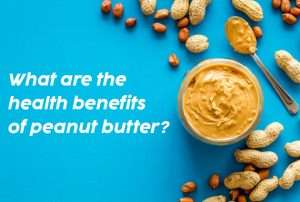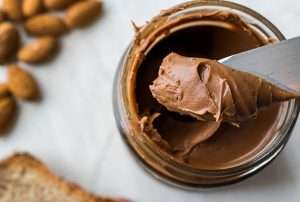Peanut butter protein: Health benefits of Peanut Butter

Many people love peanut butter for its earthy taste and healthy ingredients. Peanut butter is delicious and nutritious food that provides many health benefits. Many people eat peanut butter as a substitute for meat on sandwiches or as a healthy snack. It’s also used in many recipes, such as bread, cakes and cookies. Besides being delicious on its own, peanut butter can be used as a substitute for other foods when eating a balanced diet.
Peanuts contain protein, healthy fats, and vitamin B6
Protein is an essential nutrient that helps maintain and repair body tissues. Vitamin B6 is an important nutrient that helps the body process food and create energy. Healthy fats provide essential fatty acids that are necessary to maintain a stable temperature and regulate bodily functions. In addition, some types of fats provide insulation against extreme temperatures. Additionally, unsaturated fats help the body produce essential fatty acids. Together, these make peanut butter an excellent source of protein, healthy fats and vitamin B6.
Daily Nutrition intake
Since peanut butter is relatively low in calories compared to other foods, it’s an inexpensive way to increase your daily nutrition intake. One tablespoon of regular peanut butter contains around 80 calories; however, chunky and creamy varieties have more calories per tablespoon. Regular peanut butter – also known as regular-ground or natural-ground – has fewer total calories than chunky or creamy varieties due to less added sugar. Additionally, choosing natural peanut butter over jarred or hydrogenated versions reduces total fat, cholesterol, sodium and added sugar. As a result, choosing natural peanut butter can significantly reduce your caloric intake while still providing your daily requirements for nutrition and vitamins.
Peanut butter nutrition
Peanut butter protein has many nutritional benefits that make it an excellent food choice for health conscious consumers. It’s low cost and easy to supplement since it contains protein, healthy fats and vitamin B6 among others. Plus, adding peanuts to your diet increases your protein intake without increasing your carb intake at the same time. Because of these benefits and easy accessibility, everyone should try adding more peanuts to their diet!
Peanut butter benefits:
Helps Maintain Skin Health
Peanut butter contains a high concentration of Vitamin E, an important nutrient for maintaining good skin health. Vitamin E aids in the retention of moisture in the skin, preventing cracking and scaly patches. Vitamin E is also an antioxidant vitamin that helps to reduce the damaging effects of the sun on our skin. The end result? Radiant, moisturized skin that looks youthful for your age.
Boosts Energy Levels
Do you need a quick energy boost in the middle of the day that is free of caffeine and other stimulants? Consider using two tablespoons of peanut butter. Peanut butter protein, fat & fiber content are exactly what you need to stabilize insulin levels and ensure a constant energy supply for hours. You can take it first thing in the morning if you need a stimulant-free energy boost, especially if you work out right after waking up.
Helps Reduce Appetite
Because of the way food has been programmed into our brains, we have the problem of eating even when we don’t need to. Naturally, overeating is bad in any form or fashion, making resisting temptation a daily chore. Consuming nutrient dense foods, such as peanut butter, can help to suppress your appetite and cravings, so you stay satiated between meals and are less likely to binge on unhealthy snacks. Protein in peanut butter and its healthy fat content keep blood sugar levels stable and prevent frequent hunger.
Reduced Risk Of Heart Disease
Peanut butter is high in heart-healthy fats, such as polyunsaturated and monounsaturated fats. These have the ability to lower LDL levels and reduce the likelihood of atherosclerotic plaques forming on blood vessel walls. As a result, your risk of heart attack and stroke will be reduced.
Helps Manage Blood Sugar Levels And Diabetes
Peanut butter is a dietetic food because of its ability to slow glucose absorption and reduce insulin spikes after consumption alone or when added to a meal. This effect of peanut butter allows insulin, which may be weak and desensitized, to have a better chance of promoting blood sugar uptake. By helping to stabilize blood sugar levels, hunger is also blunted, along with a reduction in possible diabetic complications.
May Help Reduce Allergies
According to research, people who start eating peanut butter at a young age are less likely to develop serious allergies later in life, including peanut allergies. It was discovered that even if one has genetic peanut allergies, introducing a very small amount of the allergen (in this case peanuts) on a regular basis reduces the immune response significantly over time. As a result, allergic reactions are reduced or eliminated entirely. This effect is believed to carry over to other types of allergens, as it helps modulate immune activity to prevent hypersensitivity.
Slows Down Or Prevents Cognitive Decline
As we age, our brains experience some degree of cognitive decline, which can range from minor impairment to significant impairment, and in the worst-case scenario, Alzheimer’s disease. Regular consumption of peanuts or peanut butter is associated with a lower risk of cognitive decline and, in many cases, prevents it from having a significant impact on our lives. In addition to its high anti-inflammatory fat content, niacin is thought to play an important role here, as people who consume the most niacin are up to 70% less likely to develop severe cognitive deficits.
Helps Prevent Gallstones
Gallstones were thought to be caused by a high-fat diet for many years, but it has now been proven that gallstones are much more common in people who follow a low-fat diet. Most gallstones are caused by cholesterol, but if enough cholesterol is present in the blood, they can be easily treated. Under these conditions, cholesterol acts as a solvent, preventing the formation of gallstones rather than dissolving them. Low-fat diets cannot dissolve these “stones” efficiently, resulting in occlusion. Because of its high-fat content, peanut butter is an excellent way to prevent gallstone formation.
Helps Maintain Fluid Balance
Peanut butter is a surprisingly good source of dietary potassium, a mineral in which many people are deficient. Potassium acts as sodium’s inverse, assisting in the removal of excess sodium via urine, the maintenance of blood pressure and fluid equilibrium, and the optimization of blood circulation. Potassium also has a role in dilation of blood vessels, helping reduce the strain on the heart to pump blood.
Excellent Vegan Protein Source
Vegetarians have a difficult time meeting their protein needs, but peanut butter can help you get a little closer. Each two tablespoon serving contains about 8g of protein, which is ideal for consuming throughout the day.
If you are looking for a super tasty and super healthy version of a peanut butter, you are going to love our High Protein Peanut Butter with Ashwagandha and Brahmi that will satisfy your crunchy cravings. This delectable, all-natural peanut butter is sweetened with jaggery, contains the benefits of Ayurvedic herbs, and is low in calories. It’s a tasty treat that’s high in protein and antioxidants. With 7.84g of protein per serving, it’s an excellent choice for low-calorie snacking! Our High Protein Peanut Butter with Ashwagandha and Brahmi aids in muscle mass development, workout recovery, weight loss, metabolism enhancement, and appetite suppression.
FAQs
1. Can peanut butter protein help me in boosting my energy levels?
Its fats, fibre, and protein content are exactly what you need to stabilize insulin levels and ensure a steady supply of energy for hours. If you need a stimulant-free energy boost in the morning, especially if you work out right after waking up, take it first thing in the morning.
2. Can it help me regulate blood pressure levels?
Peanut butter is a dietetic food because it slows glucose absorption and reduces insulin spikes after consumption alone or when combined with other foods. Because of this effect, insulin, which may be weak and desensitized, has a better chance of promoting blood sugar uptake. By assisting in the stabilization of blood sugar levels, hunger is reduced, as is the risk of diabetic complications.
3. Where can I source good quality vegan friendly peanut butter from?
You can check out Plix’s High Protein Peanut Butter with Ashwagandha & Brahmi, it is made without dairy ingredients and is suitable for vegans and people who are lactose intolerant.
4. What makes High Protein Peanut Butter With Ashwagandha & Brahmi unique?
Plix’s High Protein Peanut Butter With Ashwagandha & Brahmi is more than just a peanut butter. It improves health while making no concessions to taste. With its rich roasted peanut flavour and natural crunch, each scoop of this butter delights your senses. Simultaneously, it is sweetened with jaggery and contains a blend of Ayurvedic herbs known to support cognitive function, memory, and relaxation.
5. How much protein does a single serving of High Protein Peanut Butter With Ashwagandha & Brahmi contain?
A single 2 tablespoon serving of High Protein Peanut Butter With Ashwagandha & Brahmi contains 7.84g of protein.














